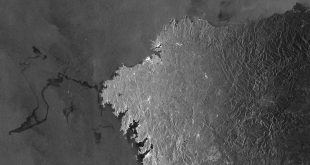IMT Atlantique | Remote sensing, Signal processing, Satellite, Environment
Read More »Search Results for: René Garello
Marine oil pollution detected from space
Whether it is due to oil spills or cleaning out of tanks at sea, radar satellites can detect any oil slick on the ocean’s surface. Over 15 years ago, René Garello and his team from IMT Atlantique worked on the first proof of concept for this idea to monitor oil pollution from space. Today, they are continuing to work on …
Read More »Campus Mondial de la Mer: promoting Brittany’s marine science and technology research internationally
If the ocean were a country, it would be the world’s 7th-largest economic power, according to a report by the WWF, and the wealth it produces could double by 2030. The Brittany region, at the forefront of marine science and technology research, can make an important contribution to this global development. This is what the Campus Mondial de la Mer …
Read More »Climate change as seen from space
René Garello, IMT Atlantique – Institut Mines-Télécom The French National Centre for Space Research has recently presented two projects based on greenhouse gas emission monitoring (CO2 and methane) using satellite sensors. The satellites, which are to be launched after 2020, will supplement measures carried out in situ. On a global scale, this is not the first such program to measure climate …
Read More »VIGISAT: monitoring and protection of the environment by satellite
Following on from our series on the platforms provided by the Télécom & Société numérique Carnot institute, we will now look at VIGISAT, based near Brest. This collaborative hub is also a project focusing on the satellite monitoring of oceans and continents in high resolution. On 12th July, scientists in Wales observed a drifting iceberg four times the size of …
Read More »Sea Tech Week: Key issues of a connected ocean
The sea is becoming increasingly connected, with the development of new real-time transmission sensors. The aggregated data is being used to improve our understanding of the role oceans play in climate issues, but several challenges must be considered: the development of autonomous sensors and the pooling of research on a global level. This was the subject of Sea Tech Week, …
Read More »An ocean of environmental data to be processed
If nowadays we can detect icebergs along the route of the Vendée Globe, track and identify ships causing pollution from space, and define ecological corridors and reserves for the protection of animal species, it is largely thanks to stations which receive and process satellite images in real time, and the progress made in the last twenty years in the field …
Read More » I'MTech L'actualité scientifique et technologique de l'IMT
I'MTech L'actualité scientifique et technologique de l'IMT






